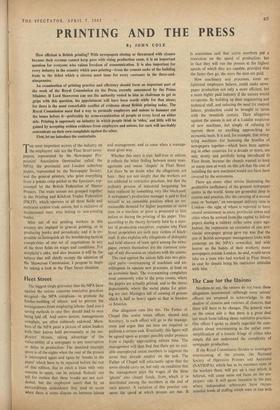PRINTING AND THE PRESS
By JOHN COLE
How efficient is British printing? With newspapers closing or threatened with closure because their revenue cannot keep pace with rising production costs, it is an important question for everyone who values freedom of communication. It is also important for every industry in the country which uses printing—from the cement sacks of the building trade to the ticket which a cinema must issue for every customer in the three-and- ninepennies.
An examination of printing practice and efficiency should form an important part of the work of the Royal Commission on the Press, recently announced by the Prime Minister. If Lord Shawcross can use the authority vested in him as chairman to get to grips with this question, his appointment will have been worth while for that alone; for there is the most remarkable conflict of evidence about British printing today. The Royal Commission must find a way to persuade employers and unions to hammer out the issues before it—preferably by cross-examination of people at every level on either side. Printing is supremely an industry in which people think in 'sides,' and little will be gained by accepting written evidence from employers and unions, for each will inevitably concentrate on their own complaints against the other.
First, let me introduce the contestants.
THE most important sectors of the industry on the employers' side are the Fleet Street news- papers, represented by the Newspaper Pro- prietors' Association (hereinafter called the NPA); the provincial and London suburban papers, represented by the Newspaper Society; and the general printers, who print everything from a potato crisp packet to the Spectator, rep- resented by the British Federation of Master Printers. The trade unions are grouped together in the Printing and Kindred Trades Federation (PKTF), which operates in all three fields and embraces sixteen trade unions, but is exclusive of maintenance men, who belong to non-printing trades.
Nine out of ten printing workers in this country are engaged in general printing, or in producing books and periodicals; and it is im- possible to distinguish all the bewildering tactical complexities of any set of negotiations in any of the three fields on wages and conditions. For simplicity's sake, and also because it will be the subject that will chiefly occupy the attention of the Shawcross Commission, I propose to begin by taking a look at the Fleet Street situation.






































 Previous page
Previous page